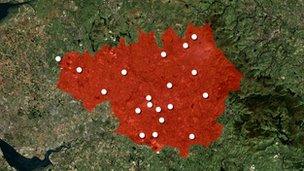The changing NHS
- Published
In 1948, the then health secretary Nye Bevan visited Park Hospital in Trafford, Manchester, to open what was the very first hospital in the new National Health Service.
Now the hospital is known as Trafford General, but its place in the history of the NHS hasn't changed.
The future, though, is looking a lot less certain.
Like many other small district general hospitals across England, it must make some very tough choices if it is to survive.
Trafford General is part of a network of at least 19 hospitals in the Greater Manchester area.
Together they look after a population of around 2.7 million people.
From the roof of the BBC's Salford headquarters you can get a feel for how close some of these hospitals are to each other.
About two miles to the north east is the big teaching hospital of Salford Royal.
Trafford General is about five miles further over to the west.
And just four miles to the east is Manchester Royal Infirmary, part of another big teaching hospital.
There are at least 16 other hospitals across the region.
Too many hospitals?
The big question is, does Greater Manchester still need all these hospitals?
It is an issue thrown into sharp relief at Trafford General.
The hospital is losing £19m a year and was recently taken over by the Central Manchester NHS Foundation Trust.
Hospital managers say it is not getting enough patients through the doors.
Their proposed solution is to downgrade Trafford's A&E unit and intensive care and end emergency surgery.
But in the local shopping centre, protesters are out to defend their local hospital from what they see as financially driven cuts.

There are at least 19 hospitals spread across the Greater Manchester region. The question is, are they all still needed?
"We feel lives are going to be put at risk by the closure of an A&E department anf intensive care" says Matthew Finnegan, of the Save Trafford General Campaign.
"Local people are really worried about what's going to happen to them when they need these kind of services locally.
"They want to save money and that means patient care is the thing that is actually being cut
New services
The proposals for Trafford General do include developing some new services as well as closing others.
Under the new plan it would become a specialist centre for orthopaedic care.
Out-patient services would continue, as would procedures like x-rays and blood tests.
Dr Nigel Guest is a member of Trafford NHS, the body that buys medical services for the local area and is proposing the changes at the hospital.
"The problem with Trafford is that for many, many years it has been spending far more money than it earns.
"At the moment it is spending £19m a year more than it is actually getting in revenue.
"That's about £1.5m a month that isn't buying any healthcare at all.
"That's unsustainable, it's a waste of public money, and we have to find a way of reconfiguring the services."
Patient safety
But there is another more pressing reason for change.
Research shows that bigger, busier hospitals are better at keeping patients safe from harm - especially when it comes to surgery.
At one of those, nearby Salford Royal, staff have worked hard over the past decade to make sure patients don't develop bed sores, pick up hospital acquired infections or have falls while staying on the wards.
It is now one of the safest hospitals in the country.
And the chief executive of Salford Royal, David Dalton, says it is clear that the more patients you see, the better the treatment.
"Patient safety is the principle reason for us to reorganise our hospital services.
"Currently they are based upon a pattern of services that was suitable for 60 years ago.
"We now know that is you specialise, if surgeons and their supporting staff see a greater volume of patients for a particular condition or procedure, you get much better outcomes.
"The evidence is clear."
Dr Guest of Trafford NHS says these clinical arguments mean a relatively small hospital like Trafford, surrounded by big teaching hospitals, has no choice but to change.
"Even if there wasn't a financial problem, the clinical argument is an absolute imperative.
"We have to make clinical changes and that would be the case even if there wasn't a financial issue. The financial problem just compounds it."
These are arguments that are being rehearsed in hospitals across England.
People value their local district general hospital and are concerned about what will happen if services like A&E and intensive care are closed.
But some of these hospitals are in financial difficulty and are not seeing enough patients to guarantee they can be treated safely.
Tough choices will have to be made - not just at Trafford General, the birthplace of the NHS, but across the health service in England.
Audio slideshow archive images courtesy Central Manchester University Hospitals NHS Foundation Trust and PA. All images subject to copyright. Music by KPM Music.
Slideshow production by Paul Kerley, Claire Kendall and Dominic Hughes.
- Published27 September 2012
- Published26 July 2012
- Published9 May 2012
- Published18 July 2012